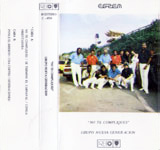Indice - Table of contents
Lo Nuevo[hide]
Reportes: From The St... : Cubadisco 2...
Tienda: Cuban Music Store
Reportes: From The St... : Cubadisco 2...
Fotos: Tom Ehrlich
Staff: Kristina Lim
Musicos: Juan Formell
Musicos: Yordamis Megret Planes
Musicos: Yasser Morejón Pino
Musicos: José Luis "Changuito" Quintana...
Musicos: Dennis Nicles Cobas
Fotos: Eli Silva
Grupos: Ritmo Oriental : 1988 - Vol. IX - 30 a...
Musicos: Rafael Paseiro Monzón
Musicos: Jiovanni Cofiño Sánchez
Fotos Del Día [hide]
SpanishEnglishDiscography - 1988-No te compliques
Primera Parte: 1988-1992, El Nacimiento de la Timba
 1988 - No Te Compliques: Este primer disco, cuyo nombre de lanzamiento fue «NG La Banda», es el único que incluye a los ex-Irakere José Munguía y Carlos Averhoff previa su partida y reemplazo por parte de Elpidio Chappotín y Rolando Pérez Pérez. Tony Calá comparte voces con cantante/conguero Victor Valdés y también se marca el debut de Issac Delgado dentro de la agrupación. Tres de las seis canciones son disponibles en «Best of NG La Banda» pero las otras tres nunca han sido incluidas en un CD. Afortunadamente «timbómano» César Díaz, desde su residencia en Nueva York (ahora en España), nos ha proporcionado una cinta EGREM original y muy rara de la cual escaneámos el JPEG que ves aquí.
1988 - No Te Compliques: Este primer disco, cuyo nombre de lanzamiento fue «NG La Banda», es el único que incluye a los ex-Irakere José Munguía y Carlos Averhoff previa su partida y reemplazo por parte de Elpidio Chappotín y Rolando Pérez Pérez. Tony Calá comparte voces con cantante/conguero Victor Valdés y también se marca el debut de Issac Delgado dentro de la agrupación. Tres de las seis canciones son disponibles en «Best of NG La Banda» pero las otras tres nunca han sido incluidas en un CD. Afortunadamente «timbómano» César Díaz, desde su residencia en Nueva York (ahora en España), nos ha proporcionado una cinta EGREM original y muy rara de la cual escaneámos el JPEG que ves aquí.
Existe una canción en «Best of NG» (Disquera Milan) llamada «No Te Compliques» pero este nombre no corresponde al tema original. La verdadera canción [escriban a EGREM] que identifica el disco es algo distinta a otros temas de NG. En ella se perciben influencias de Earth, Wind & Fire con un sazón de Mezcla presente por extenso. Valdés y Calá comparten el canto, pero la voz inimitable de Issac se escucha claramente en los coros. La canción en sí goza de una buena interpretación vocal y si tienes la suerte de toparte con un ejemplar, toma nota del tremendo solo de trompeta de Juan Mungía al minuto 3:15, el cual corona con un glissando perfecto al Fa sostenido agudo. La canción que en «Best of NG» denominan «No Te Compliques» es en realidad la segunda canción, «Se Terminó el Carnival»: una salsa melódica mellada por una absurda reverberación digital. Issac suena [CD] como si estuviese metido en una lata inmensa. Aun así escuchamos su calidad, y vaticinamos un estilo que ya manifiesta madurez en el 88. El fragmento más timbesco se revela en el mambo de 2:55 y se nos ofrece un precioso solo de piano eléctrico de Peruchín. «Conga Orientadora», nunca editada en CD, es una obra más al estilo del jazz latino, con ciertas ínfulas de Irakere o el precursor de NG, Nueva Generación. Al minuto 4:31, sin embargo, escuchamos un coro «NG La Banda» [escriban a EGREM] que sugiere quizás su utilización como tema de presentación durante los primeros conciertos. El tema siguiente da paso a la voz de Tony Calá, que como Issac, ya estaba preparado para la notoriedad. Por supuesto que para ese entonces Calá ya habría gozado de un manojo de éxitos junto a la Ritmo Oriental, y realmente no podríamos tildarlo de principiante. En esta ocasión, canta lo que probablemente es el tema más solvente del disco, «Ponle el Biberón», anteriormente incluido en «Abriendo el Ciclo» de Nueva Generación y más tarde en «En Cuerpo y Alma», una presentación en vivo de la banda. La canción es buena, pero la interpretación es excelente. Además de Calá, se invita a un recién nacido para grabar una guía breve al minuto 1:07. Un buen bloque timbero se escucha al minuto 3:03 y un bonito solo de El Greco al minuto 3:14. Los metales restantes entran con una cita de Duke Ellington hacia el final del solo. Puedes encontrar «Ponle el Biberón», (¡con su nombre verdadero!), en «Best of NG», al igual que el tema siguiente, «Cha Cortés». Las notas muy inventivas de «Best of NG» indican a Juan Formell como el compositor, pero el autor es Cortés, como nos lo confirma la cinta original de César. La melodía principal cabe nuevamente en el ámbito del jazz latino con algunos bloques estrambóticos y coros aislados. La flauta del Tosco es indudablemente la gran protagonista. Es sobresaliente como flautista —virtuoso, como se espera, pero logra además un tono excepcional: muy afinado y sensual en la entrega. El disco cierra con«Generaciones», un arreglo de Germán Velazco y otra fusión/jazz latino con un poco de scat de la parte de Valdés.
Hay más, en inglés, en The Roots of Timba

















